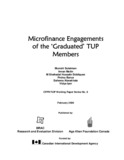Microfinance Engagements of the ‘Graduated’ TUP members
Date
2006-02Publisher
BRAC Research and Evaluation Division and Aga Khan Foundation CanadaAuthor
Sulaiman, MunshiMatin, Imran
Siddiquee, M Shahadat Hossain
Barua, Proloy
Alarakhaia, Safeena
Iyer, Vidya
Metadata
Show full item recordAbstract
Despite the slogan of ‘credit for the poorest of the poor’, the poorest have not fully benefited from the microfinance revolution of the late 90s in Bangladesh. To bring these ‘left out’ group into the mainstream microfinance, BRAC’s CFPR/TUP program assists them to build-up an asset base (physical, human and social) so that they can have meaningful participation in microfinance activities. After the ‘grant’ phase of the program which lasts for 18 months, as the first step towards the ‘graduation process’, the ultra-poor women form their own groups and are offered small amounts of credit. This study takes a look at the beneficiaries who were selected in the first round in 2002 to explain various dimensions of their engagement with microfinance. With a lower borrower-member ratio and relatively smaller sized credit, microfinance for the poorest may take longer to achieve sustainability. Even within the ultra-poor household group, the better-off ones are more likely to engage themselves with microfinance. Their engagement in semi-formal microfinance does not reduce involvement in the informal financial market. Along with credit, accumulating savings is of utmost importance for the ultra-poor households and their informal savings have increased. Given that almost a quarter of the TUP members may not be credit takers, the importance of appropriate savings products cannot be overemphasized. More innovations in this regard are thus critical.

